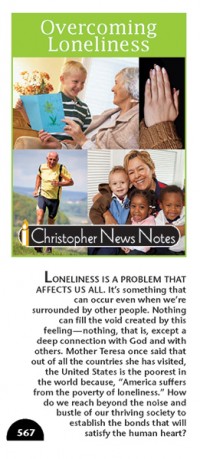 The following is the text of the Christopher News Note “Overcoming Loneliness” (which was written by a freelancer). If you’d like a pdf or hard copy, see the end of this post:
The following is the text of the Christopher News Note “Overcoming Loneliness” (which was written by a freelancer). If you’d like a pdf or hard copy, see the end of this post:
Loneliness is a problem we all face. It is a feeling that can occur even when we are surrounded by other people. Nothing can fill the void created by this feeling except for a deep connection with God and others.
Mother Teresa once said that out of all the countries she has visited, the United States is the poorest in the world because, “America suffers from the poverty of loneliness.” How do we reach beyond the noise and bustle of our thriving society to establish the bonds that will satisfy the human heart?
Age-Old Problem in Modern Times
In an interview with Eugenio Scalfari for Italy’s La Repubblica newspaper, Pope Francis characterized the problem of loneliness, particularly among the elderly, as a great evil of our time—one that needs to be addressed with the utmost urgency for the good of society.
In his message delivered ahead of the 48th World Communications Day, Francis connects loneliness to certain aspects of our modern world: “A culture of encounter demands that we be ready not only to give, but also to receive…. The internet, in particular, offers immense possibilities for encounter and solidarity. This is something truly good, a gift from God.” But he goes on to say, “The speed with which information is communicated exceeds our capacity for reflection and judgment…. The desire for digital connectivity can have the effect of isolating us from our neighbors, from those closest to us.”
These modern dimensions merely add to a problem that is as old as the human condition. We were made to live in a profound state of love in relation to God and others. God’s very nature is one of relationship between the Father, Son, and Holy Spirit in the mystery of the Trinity, and He has made us in His image, so our desire for love and connection with others emanates from the deepest recesses of the soul.
The Bible teaches that man and woman were made to be helpmates for each other because God recognized it was not good for man to be alone. The family proceeds from the bond between husband and wife and provides for our most natural and foundational connections. It is through family interaction that we develop communication skills, a sense of humor, empathetic instincts, and the ability to reconcile with each other.
Our desire for connection ultimately extends beyond family to the broader community where we seek fulfillment by sharing our gifts and enjoying the gifts of others in meaningful relationships. However, in a fallen world, bonds of love can too easily disintegrate, relationships fracture, and the ties we rely on for connection to family and community sometimes become frayed and leave us feeling isolated.
It is important to remember that God is with us in our suffering in a more profound way than at any other time in our lives. Christ’s cry of abandonment on the cross unites Him with all mankind in our deepest moments of anguish. Loneliness, like all suffering, gives us reason to draw closer to God, and we must never lose hope that good can come from any difficulty provided we turn to Him with an open heart.
Dark Night of the Soul
Saint John of the Cross experienced a desperate sense of isolation when he was imprisoned by members of his own Carmelite Order. He was locked in a ten-by-six-foot cell that barely allowed enough room for his body. After nine months, he escaped and made it to freedom with a collection of mystical poetry he had written in captivity.
His spiritual classics “Ascent of Mount Carmel” and “Dark Night of the Soul” expand on the ideas set forth in his poetry and explore the sense of distance that can occur in our relationship with God. He explains that sometimes God allows us to feel abandoned in order to purify our souls and draw us into a deeper experience of love.
Mother Teresa suffered from a long period of loneliness in her life. In a letter posthumously published in “Come Be My Light: The Private Writings of the Saint of Calcutta,” she wrote: “In my heart there is no faith—no love—no trust—there is so much pain—the pain of longing, the pain of not being wanted. I want God with all the powers of my soul—and yet there between us—there is terrible separation.”
Mother Teresa was clearly being invited into a Dark Night of the Soul for the purpose of achieving a more perfect union with God. She eventually wrote: “Let Him do with me whatever He wants as He wants for as long as He wants if my darkness is light to some soul—even if it be nothing to nobody—I am perfectly happy to be God’s flower in the field.”
Mother Teresa’s surrender to God’s will in the face of extreme loneliness led her on a lifelong journey of service to others. She saw beauty in all people and was devoted to helping the poorest of the poor. She once found a woman laying half dead in a pile of garbage, her body bitten by rodents and insects. She took the woman to a hospital and they attempted to turn her away, insisting the woman was beyond help. Mother Teresa protested and said she wouldn’t leave until they admitted her. A long meeting followed among hospital personnel and finally they granted Mother Teresa’s request. She later recalled the incident and said, “That woman was saved.”
Towards the end of Mother Teresa’s life, her letters revealed the perspective she had gained on her deep relation with God and others. She wrote to a priest: “God is in love with us and keeps giving Himself to the world—through you—through me…. May you continue to be the sunshine of His love to your people and thus make your life something truly beautiful for God.”
The Way of Love
“We have all known the long loneliness and we have learned that the only solution is love and that love comes with community.” – Dorothy Day
Upon being elected to the papacy, Pope Francis decided he would remain in the Vatican guesthouse where he had been staying for the conclave rather than move into the official residence of the Apostolic Palace. When asked about this he said: “I need to live among other people. If I was living alone, isolated, it wouldn’t be good for me.”
Francis enjoys the company he finds in the Casa Santa Marta guesthouse, where he celebrates mass every morning at 7 a.m. and sits down to meals in the dining room wherever he can find a seat. Though his decision is a break with papal tradition, it is actually in keeping with his own track-record. As archbishop of Buenos Aires, he rejected living in the mansion provided for him in favor of a much smaller apartment, and he traveled regularly among the people by bus or subway. He made a habit of going out into the streets to meet with the poor and suffering and has continued this practice since being elected to the papacy.
Francis has invited the homeless to dine with him at Saint Peter’s Square, has washed the feet of juvenile delinquents, and has called distraught people on the phone to offer comfort and advice. In taking these actions, he adds his own unique emphasis to the papal tradition of outreach to the poor by going out of his way to break down barriers between himself and others.
In an address to the Community at Varginha in Brazil, Francis said, “When we are generous in welcoming people and sharing something with them—some food, a place in our homes, our time—not only do we no longer remain poor: we are enriched.”
Francis regularly reaches out to those with disabilities in the crowds that gather in Saint Peter’s Square. A beautiful example of this took place on Easter Sunday of 2013 when he approached an eight-year-old boy with cerebral palsy named Dominic Gondreau. An usher helped Dominic’s mother, Christina, lift him out of his wheelchair and Francis took him into his arms. He hugged and kissed Dominic, who was visibly overwhelmed with joy, and he spoke to him for a moment before returning him to Christina.
Dominic’s father, Paul, said he was moved to tears by the outpouring of love demonstrated by the pope for their son. He later recalled the incident on a blog post and mentioned that a woman standing near him, who was also moved to tears, said, “You know your son is here to show people how to love.”
The Gondreaus shared with CBS News that Dominic seemed agitated all morning until the pope’s embrace, but when Francis handed him back to Christina, he was suddenly calm. She said, “It was like a little kiss from heaven.”
In November of 2013, Francis hosted 600 disabled people at a Vatican event, where he moved comfortably throughout the crowd, giving out hugs and kisses and taking the time to chat with individuals along the way. Responding to the event, Renee Schafer Horton wrote for the National Catholic Reporter: “All human beings have a profound need to have a witness to their lives. We want someone to notice us, to say we matter, to hear our cries of pain and shouts of joy. We want, in our deepest core, to be known.”
She goes on to say that Pope Francis met that need for a brief moment in time for those in attendance: “The expressions of unabashed joy and brutal relief on the faces of the disabled who were photographed are enough to make one weep. It is as if they are saying with their eyes, ‘Oh, my Lord, you SEE me. No one ever sees me!’” Horton concludes, “Pope Francis, in his near-daily examples of joyful living of Jesus’ outreach to the poor and outcast, challenges us all to open our eyes, see our brothers and sisters, and then act.”
“Loneliness comes over us sometimes as a sudden tide. It is one of the terms of our humanness, and, in a sense, therefore, incurable. Yet I have found peace in my loneliest times not only through acceptance of the situation, but through making it an offering to God, who can transfigure it into something for the good of others.”
– Elisabeth Elliot
To receive a pdf or mailed copy of “Overcoming Loneliness,” email your request to [email protected]












